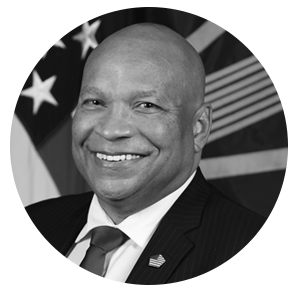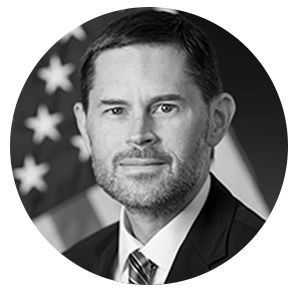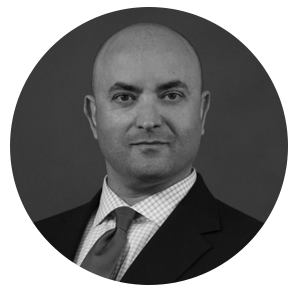Speakers

Maynard Holliday
Director of Defense Research and Engineering for Modernization, Office of the Under Secretary of Defense for Research and Engineering
Department of Defense
Read More
Maynard Holliday
Director of Defense Research and Engineering for Modernization, Office of the Under Secretary of Defense for Research and Engineering
Department of Defense
Mr. Maynard Holliday is the Director of Defense Research and Engineering for Modernization (DDRE(M)). In this capacity, he oversees investment and capability analysis of the Pentagon's modernization priorities outlined in the National Defense Strategy. He has oversight of the 11 principal directors assigned to those modernization portfolios and their roadmaps — the comprehensive strategies to manage, provide oversight and guide choices for each modernization priority area. These modernization priorities include 5G; Artificial Intelligence and Machine Learning; Autonomy; Biotechnology; Cyber; Directed Energy; Fully Networked Command, Control, and Communications; Hypersonics; Microelectronics; Quantum Science; and Space.
Mr. Holliday has over 30 years of professional experience leading technological innovations, in both government and the private sector. Most recently, he was a Senior Engineer at the RAND Corporation working on autonomous vehicle safety metrics and policy, explainable artificial intelligence, swarm robotics and drone defense. Previously, he served as Senior Technical Advisor and Special Assistant to Frank Kendall, Under Secretary of Defense for Acquisition, Technology and Logistics. Mr. Holliday helped establish the Defense Innovation Unit Experimental and was a member of the Defense Science Board. Mr. Holliday has also worked for the Department of Energy (DOE) as a project manager for the U.S.-Russia Nuclear Material Security Task Force. He was awarded the DOE’s Meritorious Service Award, its highest, for his exceptional service in helping secure tons of weapons grade nuclear material. Prior to his government service, Holliday was a senior engineering and robotics professional at the Lawrence Livermore and Sandia National Laboratories, as well as various robotics start-ups and technology companies in Silicon Valley.
Mr. Holliday is a co-organizer of Black in Robotics, a virtual world-wide community of roboticists and their allies whose mission is to bring together Black researchers, industry professionals and students in robotics to mutually support one another to help navigate academic, corporate and entrepreneurial paths to success. He is also Co-Founder of Robot Garden, the robotics-themed hacker space in Livermore, California. He also has been working with Bay Area public schools lecturing on robotics and teaching robotics through the Citizen Schools program in East Oakland. Mr. Holliday was named Citizen Schools Volunteer of the Year for 2012 and was also recognized with a Presidential Volunteer Service Award from the White House for his efforts. Before leaving government service in 2017 he was awarded the Secretary of Defense Medal for Exceptional Public Service recognizing his contributions to national security through his considerable and trusted advice on multiple DoD initiatives.
Mr. Holliday graduated from Carnegie Mellon University in 1984 with a Bachelor of Science in Mechanical Engineering. He later won a scholarship to attend Stanford University where he earned a Master of Science in Mechanical Engineering Design, with an emphasis on robotics, international security and arms control. Mr. Holliday also won a scholarship to attend the International Space University in France and was a two-time finalist for the U.S. Astronaut Corps.


Dr. Matt Turek
Information Innovation Office Program Manager
DARPA
Dr. Matt Turek joined DARPA's Information Innovation Office (I2O) as a program manager in July 2018, and served as Acting Deputy Director of I2O from June 2021 to October 2021. His research interests include computer vision, machine learning, artificial intelligence, and their application to problems with significant societal impact.
Prior to his position at DARPA, Turek was at Kitware, Inc., where he led a team developing computer vision technologies. His research focused on multiple areas, including large scale behavior recognition and modeling; object detection and tracking; activity recognition; normalcy modeling and anomaly detection; and image indexing and retrieval. Turek has made significant contributions to multiple DARPA and Air Force Research Lab (AFRL) efforts and has transitioned large scale systems for operational use. Before joining Kitware, Turek worked for GE Global Research, conducting research in medical imaging and industrial inspection.
Turek holds a Doctor of Philosophy in computer science from Rensselaer Polytechnic Institute, a Master of Science in electrical engineering from Marquette University, and a Bachelor of Science in electrical engineering from Clarkson University. His doctoral work focused on combinatorial optimization techniques for computer vision problems. Turek is a co-inventor on several patents and co-author of multiple publications, primarily in computer vision.


Brett Vaughan
Chief AI Officer
Navy
Mr. Brett Vaughan assumed the role of Navy Chief AI Officer in December 2019 under the Navy’s Office of Digital Transformation (SECNAV OCIO / OPNAV N09D). Prior to that he was, and still holds, the position of Artificial Intelligence Portfolio Manager for the Office of Naval Research (ONR). He is responsible for shaping and informing Navy plans, policies and position on Artificial Intelligence and the alignment and coordination of AI work across ONR and is the principal agent for AI-focused engagement on behalf of ONR, the Chief of Naval Research, the Chief of Naval Operations and the Secretary of the Navy.
Prior to joining ONR, Mr. Vaughan served as Science and Technology Integration and Innovation Lead on the Chief of Naval Operations Staff, OPNAV N2N6FX, Information Warfare from 2010 - 2019. Responsible for driving science and technology (S&T) gain across the Information Warfare portfolio, support to strategic S&T decision-making and related technology outreach and engagement. His previous assignment was Section Head for Technology Outreach under the Knowledge Dominance Directorate of N2N6. Mr. Vaughan entered Navy civilian service in June 2009, attached to the Strategy and Concept Development branch of OPNAV N20, where he was responsible for technology strategy development and concept innovation.
Prior to joining the Department of the Navy, Mr. Vaughan spent a twenty-year career with the National Geospatial-Intelligence Agency (NGA). Prominent assignments with NGA included: NGA Pentagon Liaison Division Chief, NGA Defense (2009-2010); NGA Liaison to the CNO N2 Staff (2003-2009); NGA Liaison to the JCS Joint Staff (1997-2002) and Operations Engineer (1995-1997). Mr. Vaughan entered federal service in 1989 after working as a cartographer for the City of Virginia Beach Mapping and Surveying Department.
Mr. Vaughan is a distinguished graduate of the U.S. Naval War College, earning a Masters of Arts in National Security and Strategic Studies. He also holds a Masters Degree in Environmental Science from Johns Hopkins University and a Bachelors Degree in Geography from the University of Mary Washington where he also completed five semesters of Russian language studies.
His honors and awards include the Meritorious Civilian Service Medal, the Joint Meritorious Unit Citation (two awards), the James V. Forrestal Award for Excellence in Strategy and Force Planning, the Marine Corps Association Writing Award, the NIMA Superior Service Medal, the DCI Meritorious Unit Citation and several letters of appreciation and commendation from OSD and the JCS Joint Staff.

Gregory C. Allen
Director, AI Governance Project and Senior Fellow, Strategic Technologies Program
Center for Strategic and International Studies
Read More
Gregory C. Allen
Director, AI Governance Project and Senior Fellow, Strategic Technologies Program
Center for Strategic and International Studies
Gregory C. Allen is the director of the Artificial Intelligence (AI) Governance Project and a senior fellow in the Strategic Technologies Program at the Center for Strategic and International Studies (CSIS). Prior to joining CSIS, he was the director of strategy and policy at the Department of Defense (DOD) Joint Artificial Intelligence Center, where he oversaw development and implementation of the DOD’s AI Strategy, drove policy and human capital reforms to accelerate the DOD’s adoption of AI, developed mechanisms for AI governance and ethics, and led frequent diplomatic engagements with governments and militaries in Europe and the Indo-Pacific regions, including China. Mr. Allen’s expertise and professional experience spans AI, robotics, semiconductors, space technology, and national security. Prior to working at the DOD, he was the head of market analysis and competitive strategy at Blue Origin, a space technology manufacturer and space launch services provider. Mr. Allen’s writing and commentary has appeared in in the New York Times, the Washington Post, The Economist, Nature, CNN, Fox News, Foreign Policy, and WIRED. He holds a joint MPP/MBA degree from the Harvard Kennedy School of Government and the Harvard Business School.


Samuel Bendett
Advisor
CNA Strategy, Policy, Plans and Programs Center
Samuel Bendett is an Adviser with CNA Strategy, Policy, Plans and Programs Center (SP3), where he is a member of the Russia Studies Program. He is also an Adjunct Senior Fellow at the Center for a New American Security. His work involves research on the Russian defense and technology developments, unmanned and autonomous military systems and Artificial Intelligence, as well as Russian military capabilities and decision-making during crises. He is a Member of CNA's Center for Autonomy and Artificial Intelligence, and an honorary "Mad Scientist" with the USARMY TRADOC's Mad Scientist Initiative. He is also a Russian military autonomy and AI SME for the DOD's Defense Systems Information Analysis Center.
Prior to joining CNA, Mr. Bendett worked at the National Defense University on emerging and disruptive technologies for the Department of Defense response in domestic and international crisis situations. His previous experience includes working for US Congress, private sector and non-profit organizations on foreign policy, international conflict resolution, defense and security issues. Mr. Bendett's analyses, views and commentary on Russian military robotics, unmanned systems and Artificial Intelligence capabilities appear in the Forbes, C4ISRnet, DefenseOne, War on the Rocks, Breaking Defense, The National Interest and The Strategy Bridge. Between 2008 and 2016, he was a foreign policy and international affairs contributor to the RealClearWorld.com blog.
Samuel Bendett received his M.A. in Law and Diplomacy from the Fletcher School, Tufts University and B.A. in Politics and English from Brandeis University. He has native fluency in Russian.

Elsa B. Kania
Adjunct Senior Fellow, Technology and National Security Program
Center for a New American Security
Read More
Elsa B. Kania
Adjunct Senior Fellow, Technology and National Security Program
Center for a New American Security
Elsa B. Kania is an Adjunct Senior Fellow with the Technology and National Security Program at the Center for a New American Security. Her research focuses on Chinese military strategy, military innovation, and emerging technologies. Her book, Fighting to Innovate, should be forthcoming with the Naval Institute Press in 2022.
At CNAS, Ms. Kania has contributed to the Artificial Intelligence and Global Security Initiative and the “Securing Our 5G Future” program, while acting as a member of the Digital Freedom Forum and the research team for the Task Force on Artificial Intelligence and National Security.
Ms. Kania also works in support of the U.S. Air Force’s China Aerospace Studies Institute through its Associates Program, is a Non-Resident Fellow in Indo-Pacific Defense with the Institute for the Study of War, and is a Non-Resident Fellow with the Australian Strategic Policy Institute’s International Cyber Policy Centre. She serves as an Adjunct Policy Advisor for the non-profit Institute for Security and Technology; contributes to the Party Watch Initiative at the Center for Advanced China Research; and co-founded the China Cyber and Intelligence Studies Institute, a non-profit research collaboration.
Ms. Kania has been invited to testify before the House Permanent Select Committee on Intelligence, the U.S.-China Economic and Security Review Commission, and the National Commission on Service. She was named an official “Mad Scientist” by the U.S. Army’s Training and Doctrine Command and was a 2018 Fulbright Specialist in Australia with the Australian Strategic Policy Institute.
Her writings and commentary have appeared in Foreign Affairs, Foreign Policy, Lawfare, Politico, Defense One, The Strategist, and The Bridge, among others. She has been quoted in outlets including The New York Times, The Washington Post, The Wall Street Journal, The Financial Times, and The Economist. Her academic research has been published in The Journal of Strategic Studies, The Cyber Defense Review, and PRISM, The Journal of Complex Operations.
Ms. Kania’s initial professional experience included time as an intern with FireEye, a summer analyst for the Department of Defense, an analyst with the Long Term Strategy Group, a young ambassador with the Carnegie-Tsinghua Center for Global Policy, and Research Fellow with the Center for Security and Emerging Technology at Georgetown University. While at Harvard, she worked as a research assistant at the Belfer Center and the Weatherhead Center.
Currently, Ms. Kania is a PhD candidate in Harvard University's Department of Government. Her dissertation will examine military learning and innovation in comparative perspective. She is also a graduate of Harvard College (summa cum laude, Phi Beta Kappa), where her senior thesis was awarded the James Gordon Bennett Prize, and has received a Master of Arts in Government from Harvard University. Ms. Kania was a Boren Scholar in Beijing, China, and she maintains professional proficiency in Mandarin Chinese. Her views are her own.

Chris Meserole
Director of Research for the Artificial Intelligence and Emerging Technologies Initiative
Brookings Institute
Read More
Chris Meserole
Director of Research for the Artificial Intelligence and Emerging Technologies Initiative
Brookings Institute
Chris Meserole is a fellow in Foreign Policy at the Brookings Institution and director of research for the Brookings Artificial Intelligence and Emerging Technology Initiative. He is also an adjunct professor at Georgetown University.
Meserole's current research is focused on two major streams. The first is how democratic governments and societies should respond to the exploitation of digital technologies by both extremist movements and authoritarian regimes. He has written widely on the challenges posed by extremist recruitment and mobilization online, and serves as a co-facilitator of the Global Internet Forum to Counter Terrorism’s working group on content-sharing algorithms. He has also advised a wide range of government offices on extremist use of the internet, as well as the Christchurch Call workstream on algorithms and radicalization.
Relatedly, Meserole has also published and spoken frequently on the rise of digital authoritarianism. As smartphones and remote sensors have proliferated, illiberal regimes have leveraged new forms of digital surveillance — typically under the pretense of counterterrorism and counter-extremism — to repress minority groups and human rights dissidents around the world. Meserole is particularly concerned with the global spread of Chinese surveillance infrastructure and governance models, which he described in a co-authored report on “Exporting Digital Authoritarianism” as well as testimony to a United States Commission on International Religious Freedom hearing on digital repression in China.
The second major stream of Meserole's research is focused on the use and impact of artificial intelligence within military applications. He is especially interested in the new norms, confidence building measures, and verification regimes that will be required to minimize the risks posed by AI-enabled military systems. Meserole has advised officials in the United States and Europe on ethical principles and policy frameworks for lethal autonomous weapons systems, and taken part in the US-China Track 2 Dialogue on AI Security led by the Brookings Institution and Tsinghua University.
Meserole's work has appeared or been featured in the New Yorker, Foreign Affairs, Foreign Policy, Wired, and other publications.

Kristin Hempstead
North America Business Development Manager of Data Science and AI Solutions
HP
Read More
Kristin Hempstead
North America Business Development Manager of Data Science and AI Solutions
HP
Kristin has been with HP for 11 years and is currently the North America business development manager for HP’s data science and artificial intelligence solutions focusing on federal, education, and public sector customers. She has an MBA from University in South Florida with a specialization in Finance and MIS and a BS in Agriculture from the University of Georgia.


Frank Konkel
Executive Editor
Nextgov
Frank Konkel is Nextgov’s executive editor. He writes about the intersection of government and technology. Frank began covering tech in 2013 upon moving to the Washington, D.C. area after getting his start in journalism working at local and state issues at daily newspapers in his home state of Michigan. Frank was born and raised on a dairy farm and graduated from Michigan State University.


Alex Treadway
Associate Publisher
Route Fifty
.


Patrick Tucker
Technology Editor
Defense One
Patrick Tucker is technology editor for Defense One. He’s also the author of THE NAKED FUTURE: WHAT HAPPENS IN A WORLD THAT ANTICIPATES YOUR EVERY MOVE? (CURRENT, 2014). Previously, Tucker was deputy editor for The Futurist for nine years. Tucker has written about emerging technology in Slate, The Sun, MIT Technology Review, Wilson Quarterly, The American Legion Magazine, BBC News Magazine, Utne Reader, and elsewhere.
